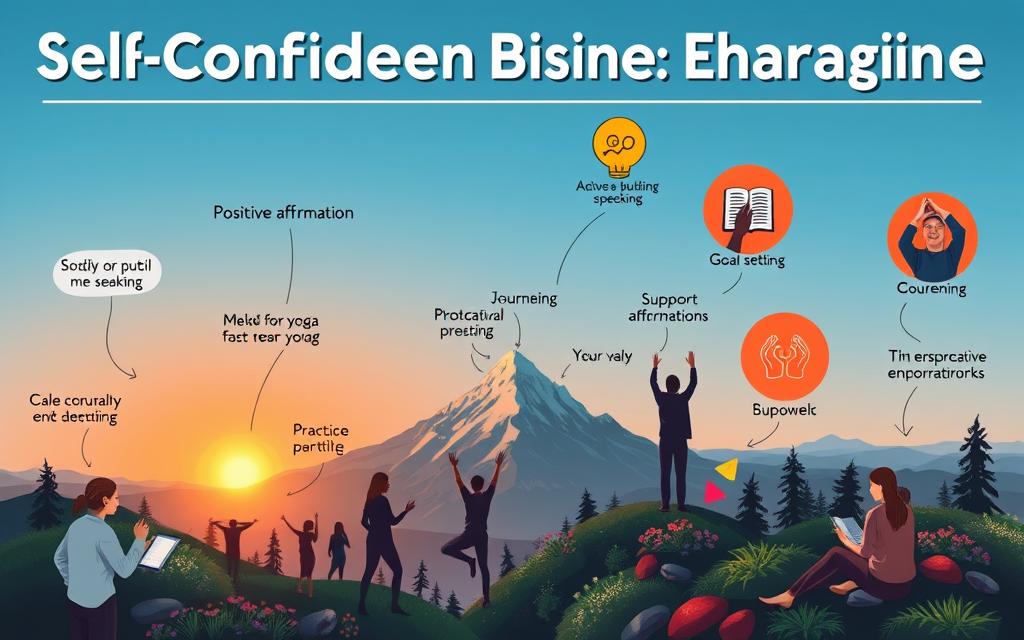Reflecting on my journey to self-confidence, I see its huge impact. It’s not just a trait; it’s a powerful force. It can unlock our true potential, leading to success in life and work. This article aims to guide you towards success, whether you face self-doubt or want to boost your confidence.
Imagine a life where you face challenges with confidence. You seize opportunities fearlessly and make decisions with self-trust. This is the power of self-confidence, and you can achieve it. By understanding confidence’s psychology, using effective strategies, and building a positive self-image, you can live a more fulfilling life.
In this guide, we’ll explore self-confidence’s transformative power. We’ll look at what shapes it, what blocks its growth, and how to build and keep it. We’ll cover overcoming negative thoughts and building a supportive network. Our journey will give you the tools and insights to enhance your self-confidence and reach your goals.
Let’s start this journey together. Let’s unlock the power of self-confidence. It’s the key to your success in life and work.
Understanding the Psychology of Self-Confidence
Self-confidence is key to personal growth and feeling good about oneself. It’s about believing in your worth, skills, and what makes you special. Building this confidence takes time, effort, and patience.
The Role of Self-Trust in Personal Development
Self-trust is at the core of self-confidence. When you trust yourself, you can face challenges, make smart choices, and chase your dreams. This trust is the base for growing as a person, boosting self-esteem and driving personal growth.
Impact on Mental Well-being and Success
Believing in your abilities changes how you see and tackle problems. People with high psychological well-being are more resilient and open to risks. On the other hand, low self-confidence can cause anxiety, self-doubt, and underestimating your strengths.
Common Barriers to Confidence Building
- Negative self-talk: Persistent inner voices that undermine self-worth and abilities.
- Social comparison: Unhealthy comparisons to others, leading to feelings of inadequacy.
- Fear of failure: Avoidance of challenges due to the fear of not meeting expectations.
Breaking through these obstacles is essential for building lasting self-confidence. This confidence can improve many areas of your life.
Self Confidence Enhancement Strategies That Work
Building self-confidence is a journey of self-discovery and growth. By using proven strategies, people can boost their self-confidence. Practicing self-compassion is one effective way. It means treating yourself with kindness and understanding, even when you make mistakes.
Setting and achieving small goals is another powerful strategy. When you reach these goals, you feel a sense of accomplishment. This boosts your belief in your abilities. Seeing challenges as opportunities for growth also helps build self-confidence.
- Using positive affirmations can help rewire the brain to focus on strengths and capabilities rather than self-doubt or criticism.
- Surrounding oneself with positive influences, such as supportive friends and colleagues, can prevent self-confidence drains caused by critical individuals.
- Practicing self-care, through activities like exercise, meditation, or pursuing hobbies, can enhance mental well-being and boost self-confidence.
By using these strategies, you can build a strong sense of self-worth. You’ll become more resilient and ready to face challenges. Remember, it’s a journey that takes patience and persistence.

Breaking Free from Social Comparison
Social comparison can really hold you back from feeling confident. Studies show it can make you feel not good enough, doubt yourself, and feel less worthy. A 2015 study found that too much social comparison on social media can make you unhappy.
Social media can really affect how you see yourself. It shows perfect lives that aren’t real, making you feel like you’re not good enough. This can make you lose confidence over time.
Developing a Personal Success Metric
To fight social comparison, focus on your own strengths and achievements. A 2003 study showed that being thankful can help fight the bad effects of comparing yourself to others. Also, limiting your time on social media and finding real connections can help your mental health.
Don’t measure your success by how others do it. Create your own way to measure success that fits your values and goals. This means tracking your own progress, celebrating small victories, and defining success on your own terms. This way, you can avoid the trap of comparison and build a stronger sense of self-worth.
The secret to escaping social comparison is to know yourself better and grow personally. By focusing on your own success and not comparing to others, you can boost your confidence. This approach helps you overcome the negative effects of always comparing yourself to others.
Cultivating a Positive Self-Image
Building self-confidence starts with a positive self-image. It’s about how we see ourselves. Focus on your strengths, be grateful, and do things that show you can grow and succeed.
Working on positive thoughts about yourself can really help. Here are some ways to build a positive self-image:
- Listen to your inner child – Treat yourself with kindness and compassion, just like you would a loved one.
- Practice gratitude – Spend a few minutes each day thinking about what you’re thankful for.
- Praise others – Giving compliments and support to others can make you feel better about yourself too.
- Set goals for personal growth – Reaching small goals can make you feel more confident and capable.
- Take breaks from social media – Avoiding unrealistic comparisons can help you feel more grounded.
By focusing on a positive self-perception and accepting yourself, you can improve your well-being and relationships. Investing in your positive self-image is a journey to lasting confidence and happiness.

The Power of Self-Compassion in Building Confidence
Self-compassion is a strong tool for boosting self-confidence. Studies show it helps reduce stress and anxiety, and lowers depression risk. By being kind to ourselves, we create a supportive space for self-acceptance and emotional health.
Transforming Self-Talk Patterns
Changing how we talk to ourselves is key to building confidence. We can switch from harsh criticism to positive affirmations. This change helps us see our growth potential and learn from mistakes, not just focus on flaws.
Practicing Self-Acceptance
At the core of self-compassion is self-acceptance. Recognizing our imperfections as part of being human lets us be gentle with ourselves. This builds confidence, knowing we deserve love and respect from ourselves and others.
Building self-compassion is a powerful way to increase self-confidence. By being kind to ourselves, changing our self-talk, and accepting ourselves, we can develop a positive self-image. This unlocks our full potential for success.
Physical Wellness and Confidence Connection
Physical wellness is key to boosting self-confidence. Regular exercise improves mood, reduces depression, and enhances body image. This leads to more self-assurance. A 2016 study showed that physical activity greatly improved body image and self-confidence.
Experts suggest at least 30 minutes of exercise three times a week. But, it’s important to enjoy the activities you choose. Proper nutrition, enough sleep, and self-care also boost mental well-being and confidence.

Focus on your physical health to connect body and mind. This leads to more self-confidence and empowerment. Remember, building confidence is a whole-body effort, and physical wellness is a big part of it.
Developing Strong Social Support Networks
Being around the right people can really boost your self-confidence. Choose relationships that make you feel good and set boundaries with those who don’t. A good social network helps you grow, gives you feedback, and keeps your self-worth strong.
Choosing Confidence-Boosting Relationships
In Colorado, 72% of young adults face peer pressure like verbal persuasion and cyberbullying. It’s important to have a supportive social circle that celebrates your strengths. People who focus on a positive self-image are 60% more likely to resist negative peer influence.
Setting Healthy Boundaries
In Colorado, 87% of young adult females feel anxious or depressed due to peer pressure. To keep your mental well-being safe, set boundaries with those who hurt your confidence. Young adults with positive influences are 70% more likely to stick to their values under pressure.
A positive support network is crucial for self-confidence. Invest in relationships that uplift you and don’t be afraid to set boundaries. Your happiness and success depend on who you surround yourself with.
Goal Setting and Achievement Strategies
Setting and achieving meaningful goals boosts self-confidence. By breaking down big goals into smaller steps, you feel a sense of progress. This success motivates you to grow more and believe in yourself.
Start by making your goals match your values and life dreams. This way, your goals are meaningful and the journey is rewarding. Create an action plan, focus on what’s important, and celebrate small wins to keep going strong.
- Set specific and measurable goals to track your progress effectively.
- Break down larger goals into smaller, achievable milestones to boost your sense of accomplishment.
- Anticipate potential obstacles and plan strategies to overcome them, building resilience in the process.
- Regularly evaluate your progress and adjust your goals as needed, staying flexible and adaptable.
- Surround yourself with a supportive network to provide encouragement and accountability.
- Visualize your success and affirm your ability to achieve your goals, reinforcing your self-confidence.

By using these goal-setting and achievement strategies, you can unlock self-confidence’s power. This opens up a world of personal development opportunities.
Mastering Body Language for Enhanced Confidence
Body language is key in how people see you and how you feel. Learning to use body language well can boost your confidence. By using certain techniques, you can show confidence and self-assurance, leading to more success.
Power Posing Techniques
Power posing is a great way to improve your body language and posture. Stand tall with your shoulders back and chin up. Studies show that this confident stance can make you feel more confident and self-assured.
Non-verbal Communication Skills
- Maintain eye contact during conversations to convey interest and build trust.
- Use open gestures and avoid crossing your arms, which can make you appear closed off.
- Slow down your movements and avoid fidgeting, as this can signal nervousness or lack of confidence.
- Offer a firm handshake to create a positive first impression.
- Mirror the body language of the person you’re talking to, a technique known as the “chameleon effect,” to build rapport and understanding.
Mastering these non-verbal skills can make you seem confident and self-assured, even when you’re not feeling it. Remember, your body language greatly affects your success and happiness.
Mindfulness and Meditation Practices
Adding mindfulness and meditation to your daily life can boost your self-confidence. These practices help you accept yourself fully. They also help you stop negative thoughts and mental chatter.
Meditation can lower stress, improve focus, and increase self-awareness. These benefits help build self-confidence. A study showed a strong link between mindfulness and self-esteem.
Women often score higher in mindfulness than men, the study found. Middle-aged adults tend to score higher in certain mindfulness areas than younger people.
The COVID-19 pandemic has made self-care and mental health support crucial. A survey showed 64% of U.S. adults focus more on mental health now. Also, 44% want more self-care guidance.
By making mindfulness and meditation part of your day, you can accept yourself more. You’ll also reduce stress and boost confidence. Try guided meditations, breath work, or just pause to be present. These practices can change how you see yourself and feel.

Building self-confidence is a journey. Mindfulness and meditation can be great tools to help you. So, why not try them and see how they can improve your life?
Building Professional Confidence
Building professional confidence is key for career growth and success at work. It means developing important skills, setting clear goals, and facing new challenges. Getting ready for big work events can really boost your confidence.
Keeping up with professional development helps a lot in building career confidence. Growing your knowledge and skills makes you feel more capable. Ask for feedback, celebrate your wins, and learn from failures to build strong professional confidence.
Workplace Success Strategies
- Embrace new challenges and step out of your comfort zone
- Emulate confident peers and learn from their behaviors
- Focus on your strengths and measure your success
- Learn from mistakes and apply the lessons to future endeavors
- Eliminate negative self-talk and maintain a positive mindset
Career Development Confidence
- Continuously seek out opportunities for professional development
- Set SMART (Specific, Measurable, Achievable, Relevant, and Time-bound) career goals
- Ask for feedback and use it to improve your performance
- Dress professionally to boost your confidence in the workplace
- Celebrate your achievements, no matter how small
By using these strategies, you can grow your professional development and career confidence. This will help you excel in your field and reach your long-term goals.
Overcoming Fear and Self-Doubt
Beating fear and self-doubt is key to building strong confidence. Instead of shying away, face your fears directly. A bit of self-doubt can actually drive you to work harder.
Challenge those negative thoughts that make you doubt yourself. Replace them with positive affirmations that boost your confidence. Remember, mistakes are part of learning and don’t define your worth.
- Embrace discomfort: Look for new experiences that challenge you. This helps you grow and become stronger.
- Visualize success: Spend a few minutes each day imagining yourself reaching your goals. It can increase your confidence and drive.
- Seek support: Be around people who support and encourage you. They can help when self-doubt strikes.
Overcoming fear and self-doubt is a journey, not a quick fix. With steady effort and a willingness to step out of your comfort zone, you can reach your full potential and achieve great success.
Developing Resilience Through Challenges
Resilience is key to staying confident, even when life gets tough. Seeing setbacks as chances to grow, not failures, helps you build mental toughness. This way, you can come back stronger from any challenge.
To build resilience, focus on positive self-talk, set realistic goals, and learn from past experiences. With a resilient and mental toughness mindset, you can face and overcome obstacles. This makes you more confident than ever.
Bouncing Back from Setbacks
Resilience isn’t about avoiding challenges. It’s about how you handle them. By being resilient, you turn setbacks into chances for growth. Learn to see the good in tough times, finding valuable lessons and insights.
- Practice positive self-talk to stay hopeful.
- Set goals that are reachable and help you progress.
- Think back on past challenges and see the strengths you’ve developed.
Building Mental Toughness
Mental toughness and resilience are closely linked. To stay strong, focus on self-care, seek support, and keep learning from your experiences.
- Do things that make you feel good physically and emotionally.
- Surround yourself with people who understand and support you.
- See challenges as chances to learn and get better.
By building resilience and mental toughness, you’ll stay confident and bounce back from setbacks. Embrace your journey of growth. Let your resilience show in everything you do.
Creating Daily Confidence Rituals
Building daily confidence-building habits boosts your self-image and self-confidence. These habits can be simple, like morning affirmations, gratitude journaling, or short meditation. By doing these activities every day, you’ll feel more positive and confident.
Morning affirmations are a great habit to start. Spend a few minutes each day saying positive things about yourself. This helps fight negative thoughts and boosts your belief in yourself.
- Start your day by writing down five things you’re thankful for. Focusing on the good can greatly improve your mood and confidence.
- Take a few minutes for a mindful meditation. It helps calm your mind, reduces stress, and increases self-awareness, all of which help build confidence.
Journaling is also a powerful daily ritual. It helps you understand yourself better by recording your thoughts and feelings. This self-discovery can make you feel more grounded and confident.
Consistency is key to lasting self-confidence. Embrace these daily routines and confidence-building habits with kindness and patience. Over time, they will become a big part of your life, helping you face each day with more belief in yourself.
The Role of Personal Appearance in Confidence
How you look affects your confidence a lot. Taking care of your appearance boosts your self-esteem. It’s about looking good in a way that feels true to you, not just following trends.
Studies show people judge others by how they look first. This shows how important grooming and how you present yourself are. They can change how others see you and how you feel about yourself.
Different colors can make people feel certain ways. For example, blue is often seen as trustworthy and professional. It’s great for formal events. On the other hand, red shows confidence and strength. It’s bold and perfect for social gatherings.
There are many ways to groom yourself. Women might wear high heels, elegant dresses, and designer perfume. Men could go for a clean shave, a suit, and a light aftershave. The goal is to find what makes you feel confident and at ease.
Looking after your appearance can really boost your confidence and happiness. By focusing on how you present yourself, you can gain confidence. This confidence can help you succeed in many areas of your life.
Conclusion
Building lasting self-confidence takes time, patience, and dedication. By using the strategies from this article, you can change how you see yourself. Confidence isn’t about being perfect. It’s about believing you can learn, grow, and face challenges.
Working on your self-confidence improves your mental health, relationships, and success. Start your journey of self-discovery. With each step, you’ll find new ways to grow and empower yourself. The journey may not always be easy, but the rewards are worth it.
Use self confidence enhancement strategies and personal growth to reach your full potential. Believe in yourself, celebrate your strengths, and keep striving to be your best. Your confidence is key to your success, and you have the power to shape your future.
